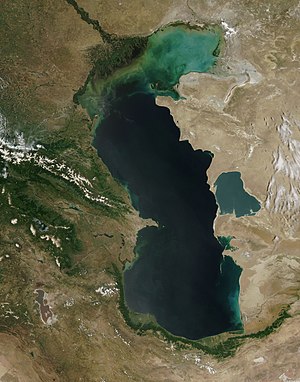First pipeline opens from Caspian Sea: Difference between revisions
| [unchecked revision] | [unchecked revision] |
m revert |
DouglasGreen (talk | contribs) m Spellchecked, added missing period, fixed category name |
||
| Line 2: | Line 2: | ||
[[Image:Caspian Sea from orbit.jpg|200px|right|thumb| The Caspian Sea, viewed from orbit. ]] |
[[Image:Caspian Sea from orbit.jpg|200px|right|thumb| The Caspian Sea, viewed from orbit. ]] |
||
Today marks the official opening of the first [[w:Caspian Sea|Caspian Sea]] oil pipeline, named the [[w:Baku-Tbilisi-Ceyhan pipeline|Baku-Tbilisi-Ceyhan pipeline]]. The $3.2 billion pipeline travels through [[w:Azerbaijan|Azerbaijan]], [[w:Georgia (country)|Georgia]] and [[w:Turkey|Turkey]], bringing crude oil from the Caspian Sea to the Turkish port of [[w:Ceyhan|Ceyhan]]. The [[w:United States|United States]] is heavily backing the pipeline, hoping to use the oil output from the pipeline to ease reliance on oil from [[w:Russia|Russian]] pipelines. The pipeline also enables the United States to avoid purchasing oil from [[w:Iran|Iran]] |
Today marks the official opening of the first [[w:Caspian Sea|Caspian Sea]] oil pipeline, named the [[w:Baku-Tbilisi-Ceyhan pipeline|Baku-Tbilisi-Ceyhan pipeline]]. The $3.2 billion pipeline travels through [[w:Azerbaijan|Azerbaijan]], [[w:Georgia (country)|Georgia]] and [[w:Turkey|Turkey]], bringing crude oil from the Caspian Sea to the Turkish port of [[w:Ceyhan|Ceyhan]]. The [[w:United States|United States]] is heavily backing the pipeline, hoping to use the oil output from the pipeline to ease reliance on oil from [[w:Russia|Russian]] pipelines. The pipeline also enables the United States to avoid purchasing oil from [[w:Iran|Iran]]. |
||
The countries who are |
The countries who are involved in the pipeline, are hoping to increase revenues from the pipeline, which is expected to ship up to 1 million [[w:Barrel (unit)|barrels]] a day. |
||
The countries are also concerned with the high likelihood of the underground pipeline to be a target of terrorism attacks. The countries hope the pipeline is well-enough protected. |
The countries are also concerned with the high likelihood of the underground pipeline to be a target of terrorism attacks. The countries hope the pipeline is well-enough protected. |
||
| Line 16: | Line 16: | ||
[[Category:Middle East]][[Category:Economy and business]] |
[[Category:Middle East]][[Category:Economy and business]] |
||
[[Category: |
[[Category:Oil]] |
||
Revision as of 12:24, 26 May 2005
Wednesday, May 25, 2005

Today marks the official opening of the first Caspian Sea oil pipeline, named the Baku-Tbilisi-Ceyhan pipeline. The $3.2 billion pipeline travels through Azerbaijan, Georgia and Turkey, bringing crude oil from the Caspian Sea to the Turkish port of Ceyhan. The United States is heavily backing the pipeline, hoping to use the oil output from the pipeline to ease reliance on oil from Russian pipelines. The pipeline also enables the United States to avoid purchasing oil from Iran.
The countries who are involved in the pipeline, are hoping to increase revenues from the pipeline, which is expected to ship up to 1 million barrels a day.
The countries are also concerned with the high likelihood of the underground pipeline to be a target of terrorism attacks. The countries hope the pipeline is well-enough protected.
Sources
- Aida Sultanova. "First pipeline from Caspian Sea opened" — Business Week Online, May 25, 2005